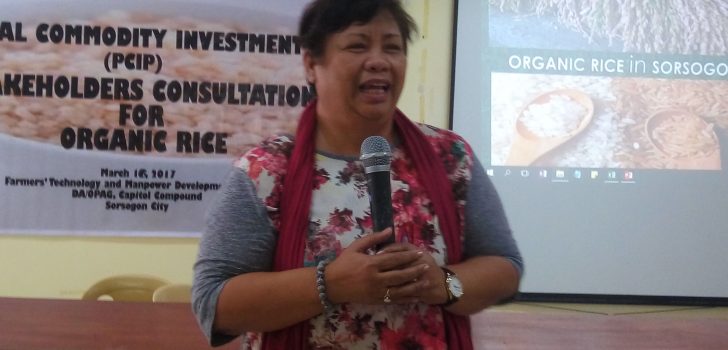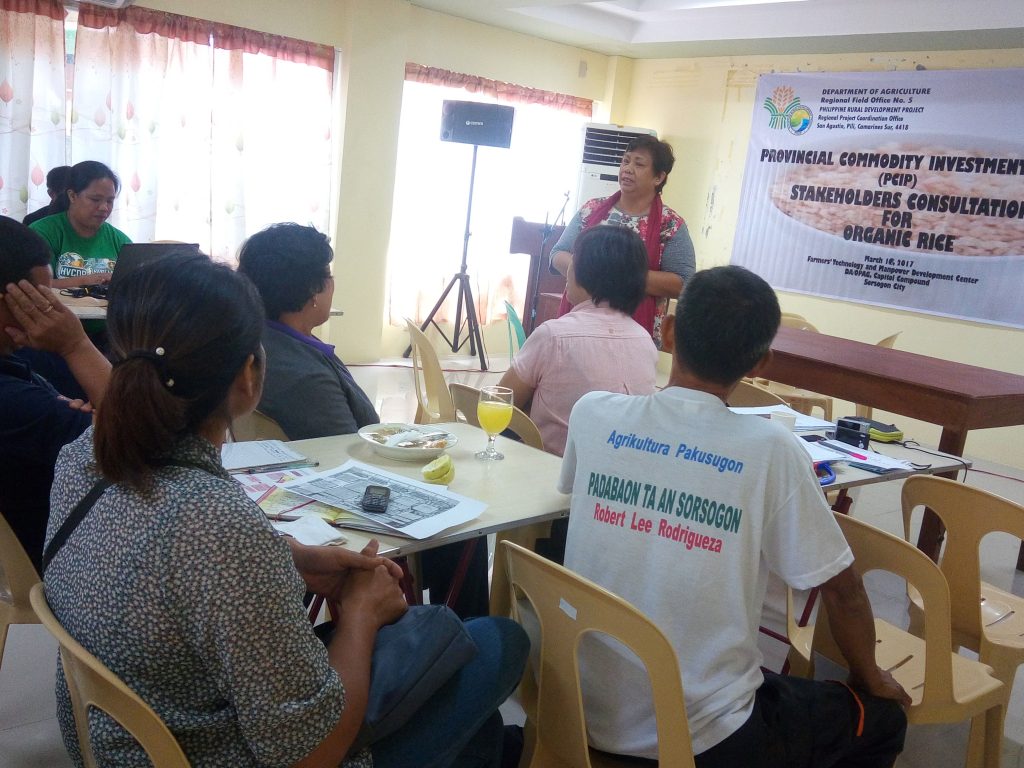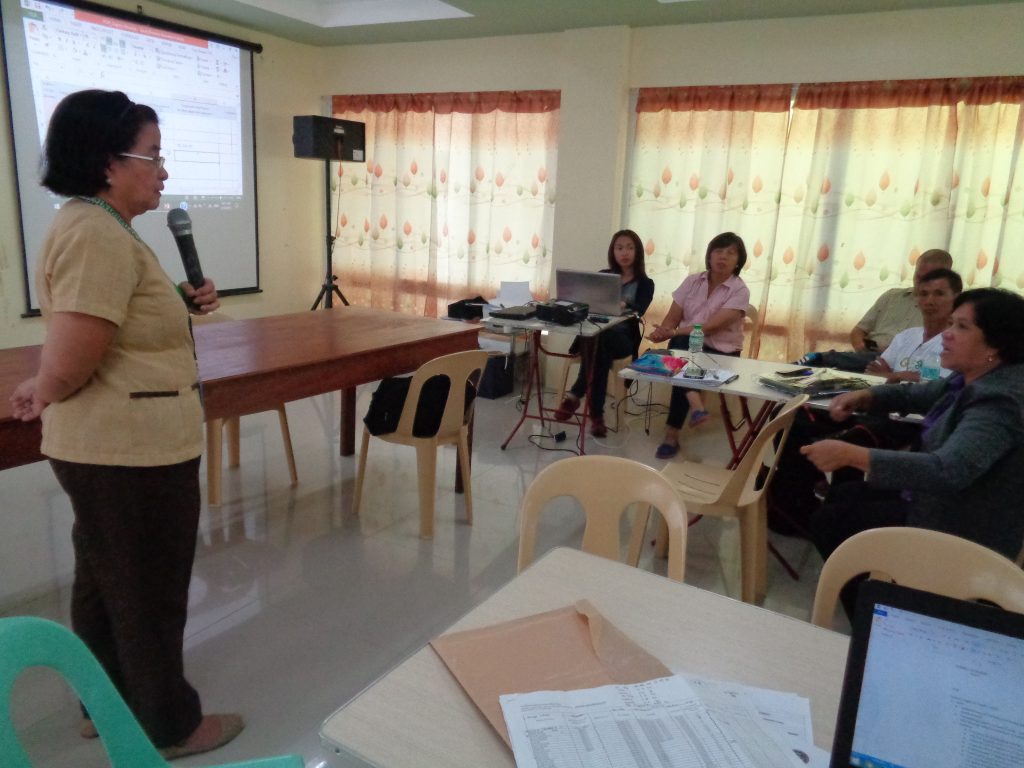 PRDP Bicol RPCO I-PLAN Component Head Aloha Gigi Bañaria encourages the stakeholders of organic rice to share their insights on the needed interventions during the Provincial Commodity Investment Plan Stakeholders Consultation for Organic Rice held on March 16 in Sorsogon City. (Photo by Annielyn L. Baleza, DA-PRDP RPCO V InfoACE Unit)
PRDP Bicol RPCO I-PLAN Component Head Aloha Gigi Bañaria encourages the stakeholders of organic rice to share their insights on the needed interventions during the Provincial Commodity Investment Plan Stakeholders Consultation for Organic Rice held on March 16 in Sorsogon City. (Photo by Annielyn L. Baleza, DA-PRDP RPCO V InfoACE Unit) Sorsogon to strengthen its “Be RICEponsible” campaign with PCIP for organic rice
The Provincial Government of Sorsogon plans to strengthen its “Be RICEponsible” campaign with the finalization of the Provincial Commodity Investment Plan (PCIP) for organic rice.
As the Be RICEponsible advocacy champion of the Department of Agriculture-Philippine Rice Research Institute’s (PhilRice) Search for Best Advocacy Campaign provincial government category, the Office of the Provincial Agriculture views the development of the organic rice industry as an opportunity to intensify and sustain the campaign in the province.
Organic rice or rice grown without the use of chemical pesticides and inorganic fertilizer is a priority commodity identified by the province to develop and expand its organic rice production area and increase yield per cropping. Organic rice contains several nutrients that help prevent heart diseases and reduce the risk of diabetes. It is also rich in fiber and several vitamins, minerals, and antioxidants.
“We’re very happy that among the provinces in Bicol, ang Sorsogon ang enot na nag-identify ng organic rice as priority commodity. Ang pagtubod kan mga farmers asin kan mga konsumidores, lalung-lalo na sa arog tang mga [tumatanda], talagang pinagduduunan na dapat we consume organic products. Though it’s a little bit expensive because of the law of supply and demand (We’re very happy that among the provinces in Bicol, Sorsogon was the first to identify organic rice as its priority commodity. Farmers and consumers, especially those who are aging believe and advocate the consumption of organic rice, though it’s a little bit expensive because of the law of supply and demand),” Bicol RPCO Local and National Level Planning (I-PLAN) Component Head Aloha Gigi Bañaria said.

PRDP Bicol RPCO I-PLAN Component Head Aloha Gigi Bañaria encourages the stakeholders of organic rice to share their insights on the needed interventions during the Provincial Commodity Investment Plan Stakeholders Consultation for Organic Rice held on March 16 in Sorsogon City. (Photo by Annielyn L. Baleza, DA-PRDP RPCO V InfoACE Unit)
During the PCIP Stakeholders’ Consultation for organic rice held in Sorsogon City on March 16, Bañaria noted that 1.6 percent of the DA-Bicol’s 2017 budget is allocated for organic agriculture, while five percent of the region’s agricultural area is targeted for the same purpose.
Eight out of 14 municipalities and one city in Sorsogon are engaged in organic rice farming. With DA-PRDP, the province aims to develop and expand its 30-hectare organic rice production area to 60 hectares and increase the yield from two metric tons to four metric tons per cropping in 2018. Sorsogon also plans to adopt new technologies and use modern infrastructure and production, post-harvest and processing facilities.
After the PCIP consultation, the stakeholders and key players agreed that the establishment of confined seed nursery or seed bank exclusive for organic rice is necessary to address the limited supply of organic inputs. They also stressed the need to conduct training on organic farming and conduct techno-demo on the recommended farming practices to resolve non-adoption of technologies on organic farming. Other potential interventions identified were the provision of drying and storage facilities, farm-to-market road construction and rehabilitation as well as distribution of processing materials, tools, and equipment exclusively for organic rice.
Virginia Oanzon, chairperson of the Sorsogon Provincial Organic Farming Practitioners Association (SPOFPA), shared her insights on the Organic Certification Center of the Philippines’ (OCCP) certification process and assured the stakeholders that SPOFPA is open for affiliation.

Engr. Argeme Gregorio of PPMIU-Sorsogon presents the PCIP matrix to solicit the stakeholders’ inputs on the interventions needed to boost the organic rice industry in Sorsogon. (Photo by Annielyn L. Baleza, DA-PRDP RPCO V InfoACE Unit)
Organic rice is among the priority provincial commodities of Sorsogon along with pili, seaweeds, abaca, coconut, goat, cacao, and coffee. Of which, pili (pulp oil) and seaweeds already have approved value chain analyses (VCA) and PCIPs endorsed by the Provincial Development Council (PDC).
Bañaria underscored that the challenge lies in transforming the PCIPs into infrastructure development (I-BUILD) and enterprise development (I-REAP) subprojects under the PRDP.
“No PCIP, no I-REAP and I-BUILD. Ang pinakaimportante, kung mailalaog sa PRDP ang mga hinahagad na interventions after analyzing the current situation of the organic rice industry sa Sorsogon, dakulang tabang kung ma-capture ng I-REAP at ng I-BUILD (No PCIP, no I-BUILD and I-REAP. The most important thing is to include the needed interventions after analyzing the current situation of the organic rice industry in Sorsogon. It will be a big help if those potential interventions will be captured by the I-REAP and the I-BUILD),” she added.
The PCIP is a three-year rolling consensus plan between the DA and the local government unit (LGU) based on the priority commodities’ VCA. The PRDP, a six-year project designed to establish an inclusive, value chain-oriented and climate-resilient agri-fishery sector, also promotes the mainstreaming of the PCIP in the policies and programs of LGUs and private institutions.
The Be RICEponsible campaign advocates four things (4Ks in Filipino) to encourage responsible rice consumption, boost farmers’ morale, and promote brown rice and other staples as substitute for rice to achieve the national goal of rice self-sufficiency and promote better health. These are: 1. Reduction or elimination of rice wastage (Kunti-kunting kanin muna, para walang tira) 2. Thanking and showing appreciation for our rice farmers (Kilalanin at pasalamatan ang mga magsasaka) 3. Eating brown rice (Kumain ng brown rice) and 4. Mixing rice with other staples (Kakaibang kanin naman). ### (Annielyn L. Baleza, DA-PRDP RPCO V InfoACE Unit)
